Fleurs du Mal Magazine


Or see the index

Gebruiksaanwijzing
Zegslieden zeggen niets. Ze geven hun meester door.
O, wat zijn ze bang in het donker. Als ze zelf redenen
om te zwijgen moeten verzinnen, met de kreet van de
wraak in de keel. Scherprechters wachten in hun ijle
dromen op bevelen. Ach, die macht over de taal.
Gebruik haar gerust want gemuilkorfd door luwte
blijven toch de lichtgelovigen. Goed onder woorden.
Bert Bevers
Gebruiksaanwijzing
Gedicht
Verschenen in Eigen terrein, Uitgeverij WEL, Bergen op Zoom, 2013
• fleursdumal.nl magazine
More in: Archive A-B, Archive A-B, Bevers, Bert

The Song
That day, in the slipping of torsos and straining flanks on the bloodied ooze of fields plowed by the iron,
And the smoke bluish near earth and bronze in the sunshine floating like cotton-down,
And the harsh and terrible screaming,
And that strange vibration at the roots of us…
Desire, fierce, like a song…
And we heard
(Do you remember?)
All the Red Cross bands on Fifth avenue
And bugles in little home towns
And children’s harmonicas bleating
America!
And after…
(Do you remember?)
The drollery of the wind on our faces,
And horizons reeling,
And the terror of the plain
Heaving like a gaunt pelvis to the sun…
Under us – threshing and twanging
Torn-up roots of the Song…
Lola Ridge
(1873-1941)
The Song
• fleursdumal.nl magazine
More in: Archive Q-R, Archive Q-R, Ridge, Lola
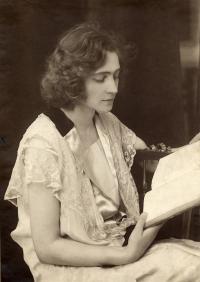
WEEMOED
Uit de bloemen en de bomen
Stijgt een onbepaalde klacht
‘s Avonds, als ik zit te dromen
En gedwee m’n weemoed wacht.
En uit alle de gewesten
Rijst een zang van droefenis
Omdat ginds in ‘t rode Westen
‘t Zonnelicht aan ‘t sterven is…
‘k Zit naar ‘t sparrenbos te staren,
Waar die stralen stervend zijn;
‘k Wou zo geern’ wat glans vergaren
Voor mijn droevig zielekijn.
Maar ze daalt reeds in de bomen
En haar stralen houdt ze bij,
Z’heeft mijn blijheid meegenomen
En wat weemoed liet ze mij.
Stil, o stille… ‘k Voel ze komen
Milde weemoedsmelodij,
Zachte, wondre weeldestromen
Brengen mij gedichtjes bij.
Stil, o stille, ‘k hoor d’akkoorden
Klagen door de schemering.
‘k Voel geen tranen, ‘k weet geen woorden,
‘k Vind alleen herinnering.
Dank, o zon, dat gij mijn zangen,
Als g’in ‘t leven slapen gaat,
Voor dees grauwe gasthuisgangen
Mild en goed behouden laat.
Dank, o weemoed, dat gij dromen
Zendt door mijne droefenis,
Wijl dees donkere dagen komen
Wijl mijn zon gestorven is…
Alice Nahon
(1896-1933)
Weemoed
• fleursdumal.nl magazine
More in: Archive M-N, Archive M-N, Nahon, Alice
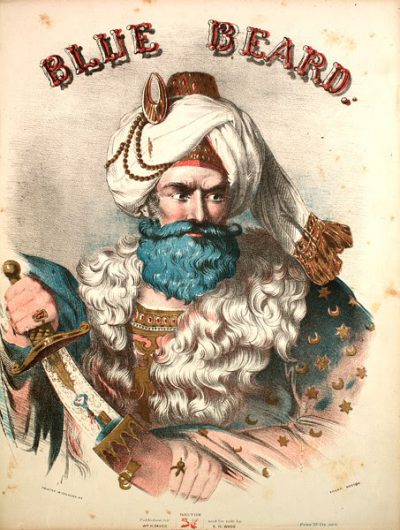
Blue Beard
Once on a time there was a man so hideous and ugly
That little children shrank and tried to hide when he appeared;
His eyes were fierce and prominent, his long hair stiff like bristles,
His stature was enormous, and he wore a long blue beard–
He took his name from that through all the country round about him,–
And whispered tales of dreadful deeds but helped to make him feared.
Yet he was rich, O! very rich; his home was in a castle,
Whose turrets darkened on the sky, so grand and black and bold
That like a thunder-cloud it looked upon the blue horizon.Blue Beard
He had fertile lands and parks and towns
and hunting-grounds and gold,
And tapestries a queen might covet, statues, pictures, jewels,
While his servants numbered hundreds,
and his wines were rare and old.
Now near to this old Blue-beard’s castle lived a lady neighbor,
Who had two daughters, beautiful as lilies on a stem;
And he asked that one of them be given him in marriage–
He did not care which one it was, but left the choice to them.
But, oh, the terror that they felt, their efforts to evade him,
With careless art, with coquetry, with wile and stratagem!
He saw their high young spirits scorned him, yet he meant to conquer.
He planned a visit for them,–or, ’twas rather one long fête;
And to charming guests and lovely feasts, to music and to dancing,
Swung wide upon its hinges grim the gloomy castle gate.
And, sure enough, before a week was ended, blinded, dazzled,
The youngest maiden whispered “yes,” and yielded to her fate.
And so she wedded Blue-beard–like a wise and wily spider
He had lured into his web the wished-for, silly little fly!
And, before the honeymoon was gone, one day he stood beside her,
And with oily words of sorrow, but with evil in his eye,
Said his business for a month or more would call him to a distance,
And he must leave her–sorry to–but then, she must not cry!
He bade her have her friends, as many as she liked, about her,
And handed her a jingling bunch of something, saying, “These
Will open vaults and cellars and the heavy iron boxes
Where all my gold and jewels are, or any door you please.
Go where you like, do what you will, one single thing excepted!”
And here he look a little key from out the bunch of keys.
“This will unlock the closet at the end of the long passage,
But that you must not enter! I forbid it!”–and he frowned.
So she promised that she would not, and he went upon his journey.
And no sooner was he gone than all her merry friends around
Came to visit her, and made the dim old corridors and chambers
With their silken dresses whisper, with laugh and song resound.
Up and down the oaken stairways flitted dainty-footed ladies,
Lighting up the shadowy twilight with the lustre of their bloom;
Like the varied sunlight streaming through an old cathedral window
Went their brightness glancing through the unaccustomed gloom,
But Blue-beard’s wife was restless, and a strong desire possessed her
Through it all to get a single peep at that forbidden room.
And so one day she slipped away from all her guests, unnoted,
Down through the lower passage, till she reached the fatal door,
Put in the key and turned the lock, and gently pushed it open–
But, oh the horrid sight that met her eyes! Upon the floor
There were blood-stains dark and dreadful,
and like dresses in a wardrobe,
There were women hung up by their hair, and dripping in their gore!
Then, at once, upon her mind the unknown fate that had befallen
The other wives of Blue-beard flashed–’twas now no mystery!
She started back as cold as icicles, as white as ashes,
And upon the clammy floor her trembling fingers dropped the key.
She caught it up, she whirled the bolt to, shut the sight behind her,
And like a startled deer at sound of hunter’s gun, fled she!
She reached her room with gasping breath,–behold, another terror!
Upon the key within her hand; she saw a ghastly stain;
She rubbed it with her handkerchief, she washed in soap and water,
She scoured it with sand and stone, but all was done in vain!
For when one side, by dint of work, grew bright, upon the other
(It was bewitched, you know,) came out that ugly spot again!
And then, unlooked-for, who should come
next morning, bright and early,
But old Blue-beard himself who hadn’t been away a week!
He kissed his wife, and, after a brief pause, said, smiling blandly:
“I’d like my keys, my dear.” He saw a tear upon her cheek,
And guessed the truth. She gave him all
but one. He scowled and grumbled:
“I want the key to the small room!”
Poor thing, she could not speak!
He saw at once the stain it bore while she turned pale and paler,
“You’ve been where I forbade you! Now you shall go there to stay!
Prepare yourself to die at once!” he cried. The frightened lady
Could only fall before him pleading: “Give me time to pray!”
Just fifteen minutes by the clock he granted. To her chamber
She fled, but stopped to call her sister Anne by the way.
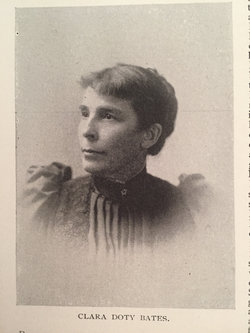
“O, sister Anne, go to the tower and watch!” she cried, “Our brothers
Were coming here to-day, and I have got to die!
Oh, fly, and if you see them, wave a signal! Hasten! hasten!”
And Anne went flying like a bird up to the tower high.
“Oh, Anne, sister Anne, do you see anybody coming?”
Called the praying lady up the tower-stairs with piteous cry.
“Oh Anne, sister Anne, do you see anybody coming?”
“I see the burning sun,” she answered, “and the waving grass!”
Meanwhile old Blue-beard down below was whetting up his cutlass,
And shouting: “Come down quick, or I’ll come after you, my lass!”
“One little minute more to pray, one minute more!” she pleaded–
To hope how slow the minutes are, to dread how swift they pass!
“Oh Anne, sister Anne, do you see anybody coming?”
She answered: “Yes I see a cloud of dust that moves this way.”
“Is it our brothers, Anne?” implored the lady. “No, my sister,
It is a flock of sheep.” Here Blue-beard thundered out: “I say,
Come down or I’ll come after you!” Again the only answer:
“Oh, just one little minute more,–one minute more to pray!”
“Oh, Anne, sister Anne, do you see anybody coming?”
“I see two horsemen riding, but they yet are very far!”
She waved them with her handkerchief; it bade them, “hasten, hasten!”
Then Blue-beard stamped his foot so hard
it made the whole house jar;
And, rushing up to where his wife knelt, swung his glittering cutlass,
As Indians do a tomahawk, and shrieked: “How slow you are!”
Just then, without, was heard the beat of hoofs upon the pavement,
The doors flew back, the marble floors rang to a hurried tread.
Two horsemen, with their swords in hand,
came storming up the stairway,
And with one swoop of their good swords
they cut off Blue-beard’s head!
Down fell his cruel arm, the heavy cutlass falling with it,
And, instead of its old, ugly blue, his beard was bloody red!
Of course, the tyrant dead, his wife had all his vast possessions;
She gave her sister Anne a dower to marry where she would;
The brothers were rewarded with commissions in the army;
And as for Blue-beard’s wife, she did exactly as she should,–
She wore no weeds, she shed no tears; but very shortly after
Married a man as fair to look at as his heart was good.
Clara Doty Bates
(1838 – 1895)
Blue Beard
fleursdumal.nl magazine
More in: Archive A-B, Archive A-B, Bates, Clara Doty, Children's Poetry, Grimm, Andersen e.o.: Fables, Fairy Tales & Stories

On a Ruined Farm near
the His Master’s Voice
Gramophone Factory
As I stand at the lichened gate
With warring worlds on either hand –
To left the black and budless trees,
The empty sties, the barns that stand
Like tumbling skeletons – and to right
The factory-towers, white and clear
Like distant, glittering cities seen
From a ship’s rail – as I stand here,
I feel, and with a sharper pang,
My mortal sickness; how I give
My heart to weak and stuffless ghosts,
And with the living cannot live.
The acid smoke has soured the fields,
And browned the few and windworn flowers;
But there, where steel and concrete soar
In dizzy, geometric towers –
There, where the tapering cranes sweep round,
And great wheels turn, and trains roar by
Like strong, low-headed brutes of steel –
There is my world, my home; yet why
So alien still? For I can neither
Dwell in that world, nor turn again
To scythe and spade, but only loiter
Among the trees the smoke has slain.
Yet when the trees were young, men still
Could choose their path – the winged soul,
Not cursed with double doubts, could fly,
Arrow-like to a foreseen goal;
And they who planned those soaring towers,
They too have set their spirit free;
To them their glittering world can bring
Faith, and accepted destiny;
But none to me as I stand here
Between two countries, both-ways torn,
And moveless still, like Buridan’s donkey
Between the water and the corn.
George Orwell
(1903 – 1950)
The Adelphi Magazine, April 1934.
• fleursdumal.nl magazine
More in: Archive O-P, Archive O-P, George Orwell, Orwell, George
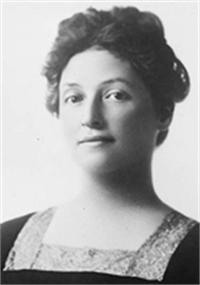
Gladness
Unto my Gladness then I cried:
‘I will not be denied!
Answer me now; and tell me why
Thou dost not fall, as a broken star
Out of the Dark where such things are,
And where such bright things die.
How canst thou, with thy fountain dance
Shatter clear sight with radiance?–
How canst thou reach and soar, and fling,
Over my heart’s dark shuddering,
Unearthly lights on everything?
What dost thou see? What dost thou know?’
My Gladness said to me, bowed below,
‘Gladness I am: created so.’
‘And dare’st thou, in my mortal veins
Sing, with the Spring’s descending rains?
While in this hour, and momently,
Forth of myself I look, and see
Torn treasure of my heart’s Desire;
And human glories in the mire,
That should make glad some paradise!–
The childhood strewn in foulest place,
The girlhood, plundered of its grace;
The eyelids shut upon spent eyes
That never looked upon thy face!
Answer me, thou, if answer be!’
My Gladness said to me:
‘Weep if thou wilt; yea, weep, and doubt.
I may not let the Sun go out.’
Then to my Gladness still I cried:
‘And how canst thou abide?–‘
Here, where my listening heart must hark
These sorrows rising from the Dark
Where still they starve, and strive and die,
Who bear each heaviest penalty
Of humanhood;–nor grasp, nor guess,
The garment’s hem of happiness!–
The spear-wound throbbing in my song,
It throbs more bitterly than wrong,–
It burns more wildly than despair,–
The will to share,
The will to share!
Little I knew,–the blind-fold I,–
Joy would become like agony,–
Like arrows of the Sun in me!
* * * * *
I hold thee here. I have thee, now,–
And I am human. But what art thou!’
My Gladness answered me:
‘Wayfarer, wilt thou understand?–
Follow me on. And keep my hand.’
Josephine Preston Peabody
(1874 – 1922)
Gladness
• fleursdumal.nl magazine
More in: # Classic Poetry Archive, Archive O-P, Archive O-P
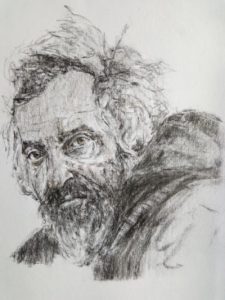


Ook als niemand
Geen blijf weten zij met zichzelf, maar zeker
kennen ze murw als getuigen hun plaats.
De hemelstreken zijn hun wanden want geen
vensters zijn er om uitzicht te kaderen. Het
zuiden is hun raam. Ook als niemand hem
uitspreekt dragen zij volhardend hun naam.
Bert Bevers
Ook als niemand
Gedicht
Geschreven bij potloodportretten van daklozen
door Kees Franken uit Bergen op Zoom
• fleursdumal.nl magazine
More in: Archive A-B, Archive A-B, Bevers, Bert
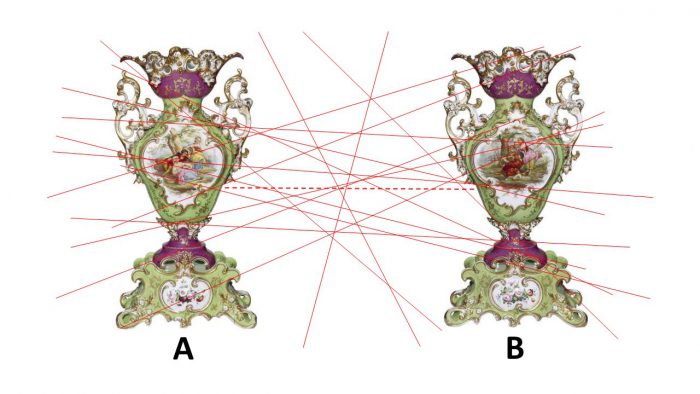
Sérgio Monteiro de Almeida
Poema visual: Pair of vases #1
Sérgio Monteiro de Almeida, Curitiba, Brazil (1964).
Intermedia visual poet and conceptual artist
Sérgio Monteiro de Almeida cv:
Curitiba, Brazil (1964). Intermedia visual poet and conceptual artist. – He has published in numerous anthologies and specialized magazines in Brazil and outside; participated in exhibitions of visual poetry as International Biennial of Visual and Alternative Poetry in Mexico (editions from 1987 to 2010); Post-Art International Exhibition of Visual / Experimental Poetry, San Diego State University-USA (1988); 51 and 53 Venice Biennial (2005 and 2009). – He published in 2007 the book Sérgio Monteiro de Almeida with a global vision about his work as a visual artist and poet. – This book was incorporated into the “Artist Books” collection of the New York City Library (USA). – Author of the CD of kinetic visual poems (EU) NI/IN VERSO (still unpublished). – He presented urban interventions in Curitiba, San Diego, Seattle, New York, Paris, Rome. – In 2014 and 2015 visual poems published in the Rampike experimental literature magazine of the University of Windsor, Canada. – He recently had his poems published in Jornal Candido (n. 64) and Relevo (2015 and 2016), and in 2017 in: fleursdumal.nl magazine for art & literature (www.fleursdumal.nl).
More about his work:
Livro eletrônico http://issuu.com/boek861/docs/sergio_monteiro_libro;
Enciclopédia Itaú Cultural de artes visuais www.itaucultural.com.br;
Videos no Youtube: http://www.youtube.com/user/SergioMAlmeida
Sérgio Monteiro de Almeida
Curitiba – PR – Brazil
email: sergio.ma@ufpr.br
• fleursdumal.nl magazine
More in: #Editors Choice Archiv, *Concrete + Visual Poetry P-T, Archive M-N, Archive M-N, Sérgio Monteiro de Almeida
Het moment dat een kind opeens weet: ik besta. Weinigen weten de taal te vinden om die ervaring op te schrijven; Tjitske Jansen kan dat.
 Kraakhelder: ‘Als elfjarige kwam ik op een middag de trap af en wist ik dat ik er was en er niet meer zomaar niet kon zijn. Ik bestond. Daar had ik zelf niet zoveel over te zeggen.’ Zoals uit de titel zowel vervreemding als aanvaarding spreekt, zo is de ‘ik’ even ontredderd als wijs, even verward als begripvol.
Kraakhelder: ‘Als elfjarige kwam ik op een middag de trap af en wist ik dat ik er was en er niet meer zomaar niet kon zijn. Ik bestond. Daar had ik zelf niet zoveel over te zeggen.’ Zoals uit de titel zowel vervreemding als aanvaarding spreekt, zo is de ‘ik’ even ontredderd als wijs, even verward als begripvol.
Die ‘ik’ is een kind dat zich vragen stelt. Over opgroeien, over haar lichaam, over God, over pleegouders, over de fietsenmaker, over zekerheden van anderen, over de tijd. ‘Ik was bijna tien. Dat was snel gegaan. Ik was dus eigenlijk al bijna twintig, dertig, veertig, vijftig, zestig, zeventig, tachtig.’ Zo dreigend kan het besef van de eindigheid zijn. Zo onontkoombaar kun je dat opschrijven.
Tjitske Jansen (1971) combineert in wat ze schrijft als vanzelf poëzie, proza en theater. Al vanaf haar vroegste bundels, de bestsellers Het moest maar eens gaan sneeuwen en Koerikoeloem, treedt ze veel op en geeft ze met grote inzet les over schrijven, poëzie en performance aan middelbare scholieren. Haar werk werd genomineerd voor De Bronzen Uil en bekroond met de Anna Bijns Prijs
Tjitske Jansen
Iedereen moet ergens zijn
Hardcover
ISBN: 9789021425825
09-03-2021
Prijs: € 18,99
• fleursdumal.nl magazine
More in: #Editors Choice Archiv, - Book News, Archive I-J, Archive I-J, Art & Literature News, Jansen, Tjitske
Poetry International heeft 11 juni tijdens het Poetry International Festival de C. Buddingh’-prijs 2021 toegekend aan de Nederlandse dichter Wout Waanders, voor zijn poëziedebuut Parkplan, een uitgave van De Harmonie. In toegankelijke verzen komt het leven van alledag aan bod: soms grappig, dan weer keihard.
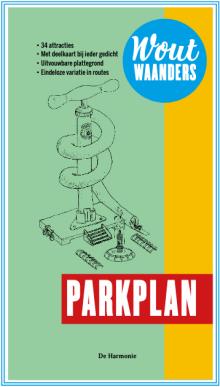 Per gedicht weet je niet wat je kan verwachten: of het start absurd, en dan gaat het over iets wezenlijks zoals ziek zijn en verdwijnen, of het begint heel serieus over hoe een relatie in de slop zit en wordt uiteindelijk weer licht.
Per gedicht weet je niet wat je kan verwachten: of het start absurd, en dan gaat het over iets wezenlijks zoals ziek zijn en verdwijnen, of het begint heel serieus over hoe een relatie in de slop zit en wordt uiteindelijk weer licht.
Dit jaar vond de ontknoping van de C. Buddingh’-prijs zowel in de zaal in LantarenVenster in Rotterdam als online plaats.
Ook de dichters Schiavone, René Smeets en Dorien de Wit maakten met hun debuut kans op de prijs.
De jury bestond uit Ellen Deckwitz (voorzitter), Mylo Freeman en Ilke Froyen.
De jury: “Parkplan is een zeer consistente bundel die handelt over de worsteling die het bestaan is, en hoe we daar met onze dagelijkse kleine onderhandelingen toch een kloppend geheel van proberen te maken.” Wout Waanders draait de realiteit een kwartslag, maar net genoeg om er helemaal in mee te gaan. Je stapt naar binnen en alles lijkt volkomen vanzelfsprekend:
Op een onbewaakt ogenblik
was er een meisje in mijn
rabarberlimonade gesprongen.
34e C. Buddingh’-prijs 2021
Voor de 34ste editie van de C. Buddingh’-prijs werden 25 poëziedebuten ingezonden. De jury prees het gemiddeld hoge niveau van de poëzie-eerstelingen. “Er werd intelligent geënjambeerd, de slimme intertekstualiteiten vlogen je om de ogen en aan ieder detail, van titel tot vormgeving, van pagina-opmaak tot kleurstelling, was aandacht besteed”, aldus de jury. “Er was een aantal waaruit niet alleen technisch, maar ook empathisch vernuft sprak. De bereidwilligheid om alleen te willen plezieren, maar ook om een statement in te nemen van wat poëzie vermag. Deze overtuigden door de eigen stem, doordat ze het risico durfden te nemen de lezer voor het hoofd te stoten, buiten de gebaande paden van de dichtkunst te willen gaan.”
Met de jaarlijkse uitreiking van de C. Buddingh’-prijs beoogt Poetry International sinds 1988 meer aandacht te genereren voor de meest talentvolle nieuwe stemmen in de Nederlandstalige poëzie. Voor menig dichter van naam was de C. Buddingh’-prijs de eerste belangrijke trofee die in de wacht werd gesleept. Joke van Leeuwen, Ilja Leonard Pfeijffer en Anna Enquist, of recenter Lieke Marsman, Ellen Deckwitz, Marieke Lucas Rijneveld en Radna Fabias en Roberta Petzoldt wonnen de prijs. In 2020 ging de prijs naar de Vlaamse dichter Jens Meijen.
• Wout Waanders wint 34e C. Buddingh’-prijs 2021
• Parkplan beste poëziedebuut van het jaar
• 25 ingezonden debuutbundels
• fleursdumal.nl magazine
More in: #Modern Poetry Archive, - Book News, Archive A-B, Archive W-X, Awards & Prizes, Buddingh', Cees, Conceptual writing, Marsman, Lieke, Poetry International, Rijneveld, Marieke Lucas
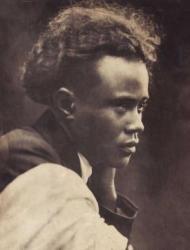
Fièvre des îles
Le soleil s’est-il brisé sur ta tête
pour que tu sentes ses éclats s’enfoncer
dans l’arbre qui soutient ton dos,
puis vriller à sec dans les branches de ton corps ?
Ton crâne est un énorme fruit vert que mûrit
la canicule de tous les Tropiques –
de tous les Tropiques, mais sans la fraîcheur
de leurs palmiers ni de leur brise marine!
Ta gorge est sèche, tes yeux s’enflamment ;
et voici que tu vois, au-delà de ce que voient les hommes,
tous les Tropiques:
voici des makis parés comme des mariés;
leurs quatre mains sont chargées de régimes de bananes,
et chargées de fleurs jamais vues par ceux qui ne sont pas
des gens de forêts;
et, parmi leur voix heureuse de se baigner au soleil,
voici tout le tumulte des cascades.
Mais, simultanément,
est-ce la glace de la terre qui t’appelle
qui déjà t’enveloppe tout entier,
pour que tu sentes ce frisson à travers tout ton être,
et pour que tu sembles vouloir te cacher sous
les nuages du ciel,
et sous toutes les feuilles des sylves insulaires,
et sous toutes leurs lourdes brumes,
et sous les dernières pluies au parfum de lait brûlé.
Scelle fortement tes lèvres afin que n’en sorte
aucune des choses que tu vois,
mais que ne voient pas les autres !
Que te berce cet écho qui s’amplifie
dans tes oreilles,
lesquelles sont devenues deux coquillages jumeaux
où palpite la mer qui t’entoure,
ô jeune enfant des îles!
Jean-Joseph Rabearivelo
(1901? 1903? – 1937)
Fièvre des îles (poème)
• fleursdumal.nl magazine
More in: Archive Q-R, Archive Q-R, Jean-Joseph Rabearivelo
Bert Schierbeek (1918-1996), schrijver en dichter, was in de Tweede Wereldoorlog actief in het verzet, waarover hij schreef in zijn debuutroman Terreur tegen terreur (1945).
 Hij was niet alleen redacteur en bestuurslid van De Bezige Bij maar ook medeoprichter en bestuurslid van het Fonds voor de Letteren, dat financiële ondersteuning geeft aan schrijvers. Ook maakte Schierbeek zich sterk voor experimentele dichters als Kouwenaar, Campert, Andreus en Vinkenoog. Hij onderhield nauwe contacten met kunstenaars uit andere disciplines: Lucebert, Karel Appel, Johan van der Keuken, Peter Schat en Jef Diederen.
Hij was niet alleen redacteur en bestuurslid van De Bezige Bij maar ook medeoprichter en bestuurslid van het Fonds voor de Letteren, dat financiële ondersteuning geeft aan schrijvers. Ook maakte Schierbeek zich sterk voor experimentele dichters als Kouwenaar, Campert, Andreus en Vinkenoog. Hij onderhield nauwe contacten met kunstenaars uit andere disciplines: Lucebert, Karel Appel, Johan van der Keuken, Peter Schat en Jef Diederen.
Zijn roman Het boek Ik (1951) is een hoogtepunt in Schierbeeks proza. In een associatief geheel van autobiografie en essay wordt de betekenis van het woord ‘ik’ bespeeld en gezocht. Vanaf de bundel De deur (1972) werd Schierbeek ook als dichter bij een groter publiek bekend. Na die tijd bleef hij voornamelijk poëzie schrijven, steeds op zoek naar naar nieuwe vormen. Een toegenomen soberheid, ook in de typografie, valt in de laatste bundels op. Bijvoorbeeld in De tuinen van Suzhou (1986), waar het rustige tempo van de haiku in doorklinkt.
Schierbeek kreeg belangrijke literaire prijzen zoals de Lucy B. en C.W. van der Hoogt-prijs (1961), de Vijverberg-prijs (1971), de Herman Gorter-prijs (1978) en de Constantijn Huygens-prijs (1991). Najaar 2004 verschenen bij De Bezige Bij zijn Verzamelde gedichten, bezorgd en ingeleid door Karin Evers.
In 2021, 25 jaar na zijn overlijden, verschijnt zijn biografie Niemand is waterdicht door Graa Boomsma, geflankeerd door een nieuw editie van Het boek Ik. Niemand is waterdicht is de bewogen biografie van een verzetsman, een Vijftiger en een levenslange reiziger.
Net als voor zijn vrienden Remco Campert en Lucebert was de Tweede Wereldoorlog beslissend in het schrijversbestaan van Bert Schierbeek, zoals blijkt uit zijn openhartige oorlogsdagboeken. Na de bevrijding tekende hij met het genre-doorbrekende Het boek Ik protest aan tegen de naoorlogse artistieke behoudzucht en het politiek conservatisme.
Schierbeek werd niet alleen woordvoerder van de Vijftigers maar bezorgde zijn literaire vrienden ook een platform: De Bezige Bij. Voor die uitgeverij is Schierbeek gezichtsbepalend geweest als adviseur en bestuurslid
Zijn veelzijdigheid als schrijver is legendarisch: hij schreef traditioneel proza, essays, toneel, poëzie én veel vernieuwend proza. Schierbeek groeide op bij zijn grootmoeder in het Groningse Beerta en bij zijn vader in het Twentse Boekelo. Begin jaren vijftig ontwikkelde zich een moeizame ménage à trois met zijn vrouw Frieda Koch en de inwonende Lucebert. Het jaar 1970 werd een rampjaar: zijn tweede vrouw Margreetje kwam bij een auto-ongeluk om het leven.
Graa Boomsma (1953) is schrijver en essayist en sinds 1988 literair medewerker van De Groene Amsterdammer. Zijn romans De laatste tyfoon (1992) en Laagland (1999) werden genomineerd voor de AKO Literatuurprijs en de Libris Literatuur Prijs. In 2017 verscheen bij Van Oorschot zijn veelgeprezen biografie van A. Alberts: Leven op de rand.
In het voorjaar van 2021 kwam vaarwel. achtergelaten gedichten uit, een door Graa Boomsma samengestelde en ingeleide bundel met teruggevonden gedichten en tekeningen van Lucebert. Op 9 juni 2021 verschijnt van de hand van Boomsma Niemand is waterdicht, de biografie van Bert Schierbeek.
Auteur: Graa Boomsma
Niemand is waterdicht
De biografie van Bert Schierbeek
Uitgever: De Bezige Bij
juni 2021
ISBN: 9789403121611
NUR: 320
Gebonden
640 pagina’s
Prijs: € 39,99
• fleursdumal.nl magazine
More in: #Biography Archives, - Book News, - Book Stories, Archive A-B, Archive S-T, Archive S-T, Art & Literature News, Bert Schierbeek
Thank you for reading Fleurs du Mal - magazine for art & literature